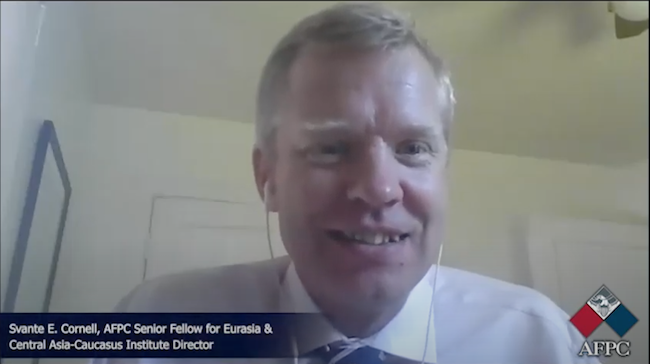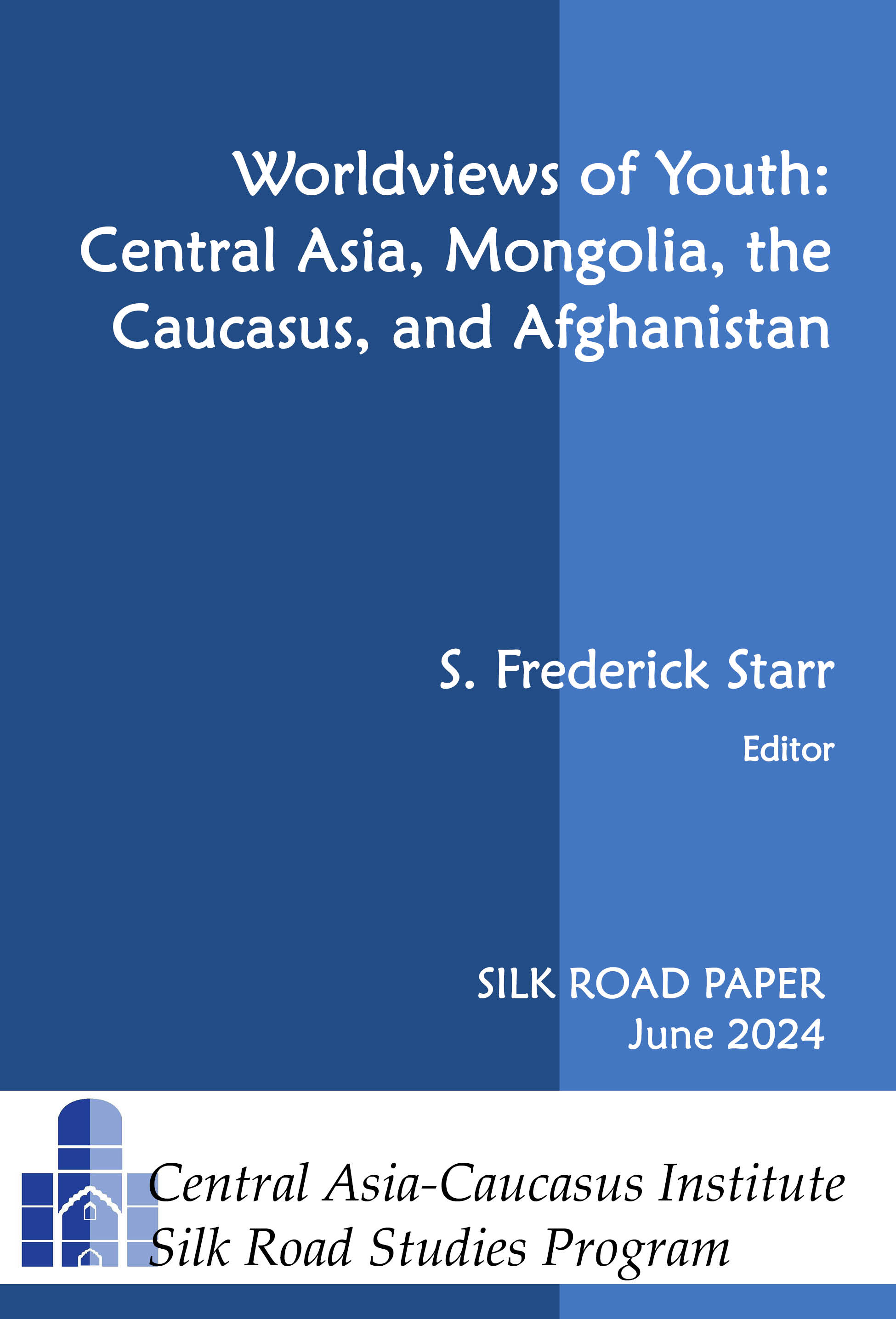Worldviews of Youth: Central Asia, Mongolia, the Caucasus, and Afghanistan
By S. Frederick Starr ed.
Central Asia-Caucasus Institute & Silk Road Studies Program
Silk Road Paper
June 2024
Introduction
Nearly all commentators on the evolution of the countries of Central Asia, Mongolia, the Caucasus, and Afghanistan, (i.e., the “CAMCA” countries) have concentrated on older adults and ignored younger men and women. This collection focuses instead on members of the younger generation whose outlooks have been largely neglected until now.
But what, we must ask, is a generation? For a century Europeans and Americans have coined cliches to describe each rising cohort of young people. Early on they defined their subject as young men and women in their late teens and early twenties. Now the definition commonly stretches further back into the earlier teen years. At the same time, the concept of a generation has itself changed. It was once commonly defined in biological terms, which meant a period of twenty or more years. Today –at least in the West— a social and political “generation” is often shortened to only a single decade.
Why are the views of members of the rising generation in the CAMCA countries (Central Asia, Mongolia, the Caucasus, and Afghanistan) of importance? Very simply, because their life experience differs so starkly from that of both their parents and grandparents. Their parents were raised by people born and educated in the Soviet Union or in Mongolia, under Soviet influence. In every one of these countries the current generation of parents has also been challenged by personal contact with the modern world on a global scale and by their national governments’ efforts to respond to it. As a consequence, they sit uneasily on two stools, past and present, institutional and personal, and bravely try to seek a workable balance between them. As is clear from the essays below, they do not always succeed at this. It is no exaggeration to say that parental influence on source offspring across the region has diminished.
A second and obvious issue that distinguishes the young generation in all of the countries under study is their massive access to cellphone technology and the internet. This development, which contrasts to the experience of some but not all of their elders, gives them access to world-wide “neighborhoods” of like-minded people. This constitutes second and non-institutional forms of education, which contrasts sharply with what is offered in schools, but which is very powerful nonetheless. The scale of contact with this world among members of the young generation is immense. However, it often occurs at the price of reduced communication with their more diverse physical neighbors at home. Moreover, as is clear from the reviews included in this collection, the attention of young people is also focused as much or more on music and pop culture as on the subjects that dominate traditional newspapers, radio, and TV.
All of these pressures and tensions bear directly on educational systems across the entire region and beyond. Educational reform in a post-Soviet spirit has indeed gone forward in all the countries under study, but it has been slow, tentative, and bureaucratic. Worse, to the extent it exists at all, reform has been concentrated at the university level. In some countries the rising generation has been emancipated from Soviet-type training in lower schools by the appearance of a few private institutions, but these are few in number and accessible only to the well-to-do. For the most part, younger men and women across the region are still the product of Soviet-type lower schools. While this results in high competence in mathematics and basic science, it lags in both the social sciences and humanities, leaving these fields wide open to informal learning from the internet and other non-traditional sources.
It goes without saying that the contemporary world is full of continuities that often go unnoticed. Upbringing in the family, the impact of neighbors, religion, traditional life-cycle customs, and deep-rooted musical traditions all remain much as they were in the past. Yet, acknowledging this, it is hard to imagine three generations whose life experiences differ more radically from each other than those of a typical CAMCA family over the course of recent decades.
In a first effort to map at least the outlines of the rising generation across the CAMCA region, the Central Asia-Caucasus Institute turned to its own region-wide team of experts, the 280 men and women from all ten countries who have participated in the fellowship program launched fifteen years ago by the Rumsfeld Foundation and our Institute. Now a diverse band of highly accomplished members of their societies, these leaders of business, government, the professions, and press train and hire older members of the rising generation and work closely with them on a daily basis. Many also observe the young through their own children and through their children’s friends and schoolmates.
As editors, we will resist the temptation to extract conclusions from the diverse evidence in this report or to propose implications for each of the ten societies included and for the larger region of which they are all a part. This is instead the challenge which our CAMCA contributors set before each reader. To guide such reflection, we offer the following five questions: First, is it possible to speak of this region’s rising generation as a single cohort and, if so, what are its boundary ages? Second, is it possible to speak of common generational features across the entire region, or should we focus instead on smaller groupings or even on the distinct generational identities of individual countries? Third, looking forward, what degree of discontinuity should we anticipate on a national, sub-regional, and regionwide basis? Fourth, are the CAMCA countries prepared to deal with the discontinuities and changes that the rising generation may generate? And, fifth, to what degree is the entire CAMCA region coming to participate in what French sociologist Claude Levi-Strauss called “the global monoculture”?
Register for the 2024 CAMCA Conference - June 12-13 - Bishkek, Kyrgyzstan
Register for the annual Central Asia - Mongolia - Caucasus - Afghansitan (CAMCA) Regional Forum scheduled for June 12-13 in Bishkek, Kyrgyzstan. The CAMCA Regional Forum is a non-political and non-partisan Forum established to promote region-wide discussions on means of advancing economic growth and development in the 10 countries of the region: Afghanistan, Armenia, Azerbaijan, Georgia, Kazakhstan, Kyrgyzstan, Mongolia, Tajikistan, Turkmenistan and Uzbekistan. It promotes this goal by fostering dialogue and interaction among rising young leaders from all sectors in the 10 countries of the region, as well as with international leaders and stakeholders. The Forum organizers - the CAMCA Network, Central Asia-Caucasus Institute and the Rumsfeld Foundation - believe that expanded communication and collaboration among talented professionals from a range of fields can significantly contribute to economic, political and social development on both a national and regional basis.
The Forum is a premier opportunity to engage with prominent influencers and leaders in the CAMCA region and to gain firsthand insights on the region’s pulse and latest developments. The Forum’s non-political and non-partisan mission facilitates an environment for open conversation aimed toward the prosperity of the region and its people. The Forum was established as one of the first and only platforms to bring together representatives of the 10 CAMCA countries, spanning from the South Caucasus to Mongolia, to discuss emerging opportunities for regional cooperation and integration. Due to the diverse and impressive pool of participants, the Forum essentially serves as a ‘one-stop shop’ for professionals of all sectors who are interested in regional cooperation and partnerships, as well as for outside nations, businesses and organizations that have an interest in engaging with the region.
Click here for more information and to register.
CACI Forum: IMF Economic Outlook for Central Asia and the Caucasus, Fall 2021
The Central Asia-Caucasus Institute invites you to the presentation of the International Monetary Fund's Regional Economic Outlook for Central Asia and the Caucasus, published in October 2021.
Speakers:
Subir Lall, Deputy Director, Middle East and Central Asia Department, International Monetary Fund
Mamuka Tsereteli, Senior Fellow, Central Asia-Caucasus Institute at American Foreign Policy Council
Moderator:
S. Frederick Starr, Chairman, Central Asia-Caucasus Institute at American Foreign Policy Council
When: Tuesday, November 30, 2021, 11 AM-12:15 PM EST
Register and join on Zoom - Password: caci2020
CACI/CAMCA Joint Forum: Afghanistan After the Taliban Takeover of Power
Afghanistan After the Taliban Takeover of Power
Co-organized by: The Central Asia-Caucasus Institute at AFPC, The CAMCA Network and The Rumsfeld Foundation
This forum will examine developments in and around Afghanistan since the dramatic takeover of power by Taliban in August 2021. CAMCA Network speakers will discuss developments in the areas of security, economics and media.
Speakers:
Shoaib Rahim, Associate Professor, American University Afghanistan
Lieutenant General Sami Sadat, Former Commander of Afghan National Special Operations Corp
Omar Sharifi, Country Director, American Institute of Afghanistan Studies
Lotfullah Najafizada, Director at TOLOnews and Pritzker Fellow at the University of Chicago
Farishita Sakhi, Ph.D. Candidate, Jimmy and Rosslyn Carter School for Conflict Analysis and Resolution, George Mason University
Moderator:
S. Frederick Starr, Chairman, Central Asia-Caucasus Institute at American Foreign Policy Council
When: Thursday, November 11, 2021,10:00 -11:30 AM EDT
Join on Zoom - Password: camca2021
The event will also be live-streamed here and on the CACI Facebook page.
CACI Director Svante E. Cornell Interview on AFPC Insights Episode 5: The Changing Politics of Central Asia
On June 26, CACI Director, Dr. Svante E. Cornell discussed the recent e-CAMCA (Central Asia, Mongolia, Caucasus, Afghanistan) regional conference organized by CACI and the Rumsfeld Foundation, the region's response to COVID-19, progress with political and economic reforms, risks and opportunities for regional states with regard to China-U.S.-Russia competition in the region.
Listen to the extended interview with a q&a session: https://bit.ly/3g0nqk5
Watch the recording of the interview: https://www.youtube.com/watch?v=yPBMeP0yZGA
Scroll down to listen to the full recording of the event.


